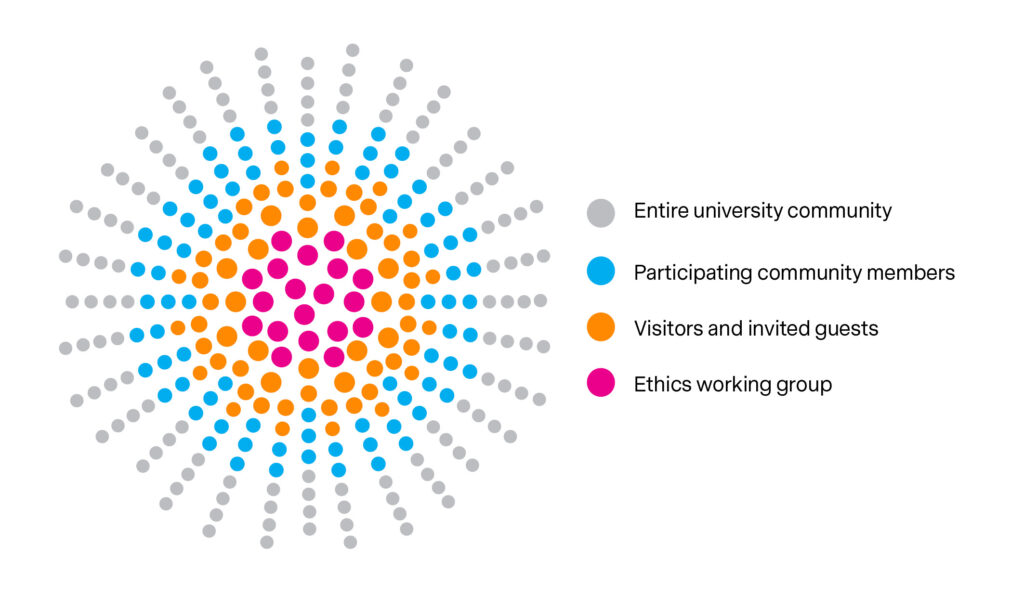Mervi Heikkinen, Anne Keränen, Satu Pitkäaho, Minna Ruddock, Sirpa Aalto, Aki Manninen, Hely Häggman, Minna Soini-Kivari, Antero Metso, Heidi Huttunen, Aija Ryyppö, Pertti Tikkanen, and Riitta Keiski
Based on the experiences in the development and running of a research ethics working group at the University of Oulu, we discuss advances and current challenges in multidisciplinary collaboration and bring forward the concept of ethical response-ability as the key capability in scientific knowledge production.
Increased speed in academic research poses a controversial challenge. As research processes from data collection and analysis to the acquisition of results become faster due to digitalisation, digital data, big data analytics and easy-access open science, we are simultaneously required to slow down and take time to pay careful attention to research ethics, GDPR and research integrity considerations.
The research community encounters the necessity to up-scale research integrity capabilities to strengthen fair and just academic culture in all disciplines and multidisciplinary research fields. This is important also for preventing cases of research misconduct. Support systems or institutional mechanisms for reliable collegial advice, as identified in e.g. the Standard Operation Procedures for Research Integrity (SOPs4RI) project (SOPs4RI – Promoting Excellent Research, 2020) are therefore essential. The principles of responsible and open science have been accepted widely, and Finnish universities actively encourage researchers to follow them. Responsible research emphasises research integrity in every respect and aims to ensure the ethical foundation of new knowledge – its exactness and ’discipline’, i.e. following existing regulations, transparency and open science. All these aspects are familiar and inbuilt in democratic societies.
This article describes the structures, processes and resources of a research ethics working group operating in the University of Oulu, the large, multidisciplinary and also northernmost university in Finland. The authors of this article were involved in this working group as active members. Based on our experiences, we discuss some advances and current challenges in multidisciplinary collaboration, and bring forward the concept of ethical response-ability as the key capability in scientific knowledge production.
Creating a culture of care
In practice, to achieve these goals means arranging continuous research integrity training for teachers, researchers and students. This is especially important in today’s mobile and hybrid research context that poses additional challenges for the continuity of ethically sound research praxis. In ensuring high-quality research integrity training, the following factors appear critical:
Availability, defined by the scheduling and format of delivering the research integrity training.
Quality in content design, i.e., practical lessons and topics that are interesting, timely and sometimes even entertaining.
Collegiality, defined as collective understanding and sensemaking – we together are response-able.
We view these dimensions as foundational starting points for success in arranging successful research integrity support, and moreover for creating an institutional culture for care instead of a “crime and punishment” type of approach.
Research integrity training could be understood as a collective form of response-ability, in line with Donna Haraway’s concept of an ability to respond with collegial and collective support. All these have formed the basis for the research ethics working group operations at the University of Oulu in Finland.
The structures, processes and resources of a research ethics working group
Our research ethics working group forms a multidisciplinary community of committed researchers and staff members. This community acts as a forum for its members as well as a space where local, national and international contributions can be made for advancing research ethics. Thus, the ethics working group gradually builds up as a Community of Practitioners (CoP).
The basic principles of research integrity (honesty, responsibility, fairness and accountability) create an institutional ethos for conducting responsible research and innovation. In the following we outline how the work was planned and carried out.
The twelve members of the working group were appointed for a three-year term. The main task of the group was to facilitate discussion on values and ethical questions at the university and to find ways of making these values visible in the work of the university.
The working group gathered once a month to discuss current matters. The group had a formal meeting agenda and structure, with an appointed chair, vice chair and secretary, but the atmosphere was always open for discussion. In most meetings, we also shared information from national or European-level research integrity activities.
The core activity of the group was to organise two events per year for the whole research community of the university and discuss emerging important issues for researchers. Our intention was to ensure that the event was topical and served the multidisciplinary backgrounds and interests of the research community. Thus it was beneficial that the ethics working group had representation from each faculty, and that the monthly meetings had invited guests representing various institutional operations at the university to share their considerations and views on research ethics. Figure 1 illustrates the ethics working group’s work as a diffusive organisation.

Summary and recommendations
A community of engaged practitioners representing all faculties of the university is the core for the successful operation of the research ethics working group – as well as for the cultivation of an institutional response-ability. Regular monthly meetings helped us to get to know each other and to deepen our understanding of the operational environment with the support of guests sharing their information. Recent studies, reports and information sharing on research integrity policy improvements on our institution ensured information flow and the ability to construct an accurate picture of the current stage of research integrity challenges institutionally, nationally, and internationally. University-level events gathering people physically and online to learn about research integrity issues were an additional way to build community, share challenges and find solutions for collective academic discipline as well as flourishing.
Based on our lessons learned, our recommendations can be pinpointed as follows:
Appoint a multidisciplinary CoP for a sufficiently long term to facilitate organisation-level discussion on research integrity and the acknowledgement of research ethics concerns.
Co-create a systematic routine for the internal collaboration of the CoP (for example monthly meetings) to keep the wheels rolling.
Co-design a joint workplan for organising events and activities based on local needs and affordances. Extensive networking helps identify synergies!
Communicate about activities and events frequently and through various communication channels ─ this is an essential part of community building.
Our understanding is that community-based pre-emptive ethics is an important approach in constructing collective research ethics competencies within an institution and for developing professional researcher ethics. In addition, this demands concrete and practical resources.
The human resources available through the allocation of our worktime were sufficient to carry out the planned activities. It is worth mentioning that having members both from administration and from different faculties enabled efficiency in our activities. Practical tasks were shared, including secretarial work such as keeping memos and sending meeting invitations, being in touch with university administration, communication and organising events.
At the university level, the cultivation of research ethics structures, processes and resources is an on-going activity. As we write this paper, a new ethics working group has been appointed to carry on and advance the collective responsibility on research ethics and integrity for the following three years.
Finally, we think that ethical considerations need to be among the first thoughts when designing a research project and should be elaborated consciously, collectively as well as constantly during and after the research project. The research ethics support processes should be also streamlined so that they are in line with the speed and requirements of the modern digital data era.
Mervi Heikkinen (corresponding author), Research Integrity Adviser, Adjunct professor and University lecturer in university pedagogy, Faculty of Education and Psychology, University of Oulu, Finland
Anne Keränen (corresponding author), Adjunct Professor, Oulu Business School, Martti Ahtisaari Institute, University of Oulu, Finland
Satu Pitkäaho, Research Integrity Adviser, Project Coordinator in the Faculty of Technology, University of Oulu, Finland
Minna Ruddock, Research Integrity Adviser, Research Director, Infrastructure for population studies, Faculty of Medicine, University of Oulu, Finland
Sirpa Aalto, Head of Research Funding, Hanken School of Economics, Finland (former Research Coordinator, Faculty of Humanities, University of Oulu, Finland)
Aki Manninen, Professor, Faculty of Biochemistry and Molecular Medicine, University of Oulu, Finland
Hely Häggman, Professor, Faculty of Natural Sciences, University of Oulu, Finland.
Minna Soini-Kivari, Student, Faculty of Education and Psychology, University of Oulu, Finland.
Antero Metso, Student, Faculty of Medicine, University of Oulu, Finland.
Heidi Huttunen, HR Service Manager, Unit for Human Resources, University of Oulu, Finland.
Aija Ryyppö, Senior Specialist, Unit for Strategy and Science Policy, University of Oulu, Finland
Pertti Tikkanen, University of Oulu, Finland
Riitta Keiski, Professor, Faculty of Technology, University of Oulu, Finland
Further reading
Haraway, D. J. (2016). Staying with the Trouble: Making Kin in the Chthulucene. Durham: Duke University Press.
SOPs4RI – Promoting Excellent Research. (2020, October 7). SOPsRI.eu.
